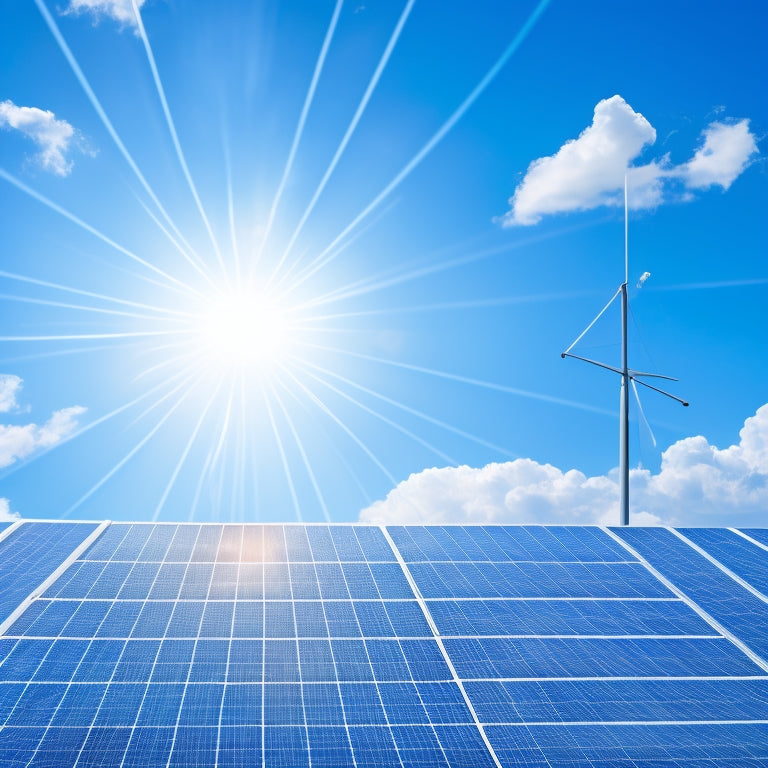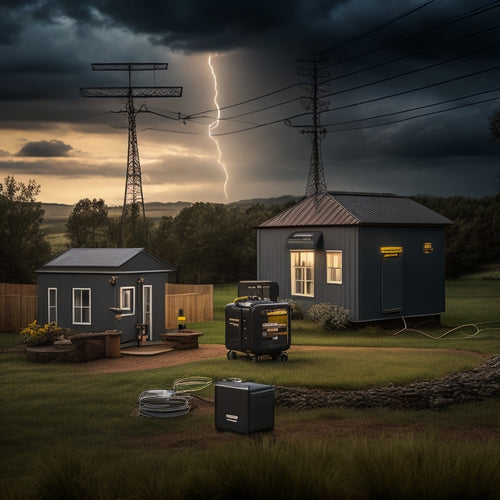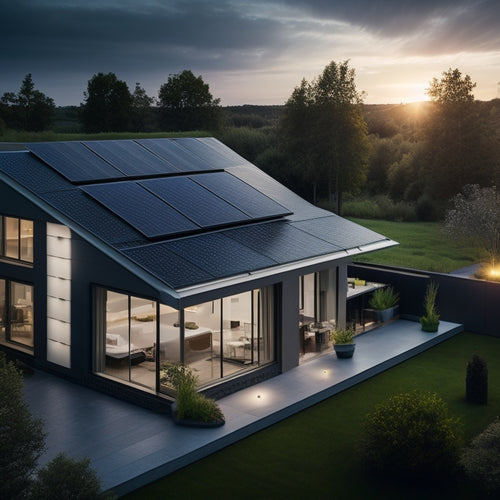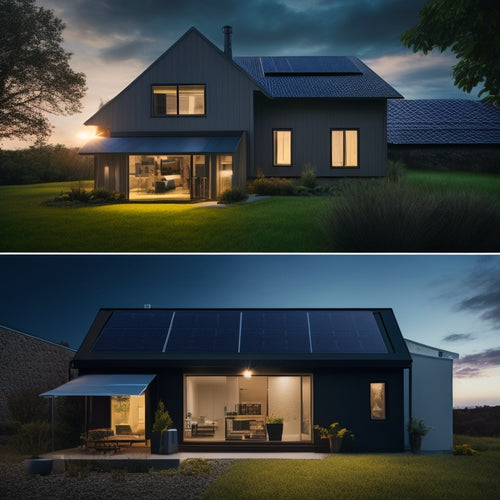
Solar Panel Prices
Share
You can expect to pay between $2.50 and $3.50 per watt for solar panels, which translates to a total cost of $15,000 to $25,000 for a typical residential solar panel system, depending on factors such as system size, panel efficiency, and installation costs. The cost of your solar panel system will also depend on your roof's size, orientation, and shading, which affect the number of panels you'll need. Understanding the variables that impact pricing is essential to making an informed decision. As you investigate the benefits of solar energy, you'll find that the savings and returns on investment are worth considering further.
The Essentials
- Average savings for homeowners switching to solar can reach up to $500 annually, resulting in substantial long-term savings on energy bills.
- High-efficiency solar cells can increase energy output, leading to more savings and potentially offsetting the initial cost of solar panel installation.
- The cost of solar panels varies depending on factors such as roof size, panel efficiency, and installation complexity, affecting overall pricing.
- Installing solar panels can increase property value by up to 17%, providing a strong return on investment over time and potentially offsetting initial costs.
- Locking in a fixed energy rate with solar panels protects against rising utility bills, providing predictable energy expenses and long-term savings.
Zero Energy Bills Guaranteed
You're likely interested in going solar because you want to save on energy costs.
With a well-designed solar panel system, you can expect reduced reliance on the grid and lower your carbon footprint, contributing to a cleaner and more sustainable future.
You can expect energy savings guaranteed, which means you'll be producing enough energy to power your home.
This translates to zero utility bills, a significant benefit that can help you recoup your investment in solar panels over time.
Energy Savings Guaranteed
Your investment in solar panels comes with a considerable benefit: energy savings guaranteed. With solar panels, you can lock in a fixed energy rate, shielding you from rising utility bills and providing you with a sense of energy independence. This benefit is further amplified by incentive programs, which can greatly reduce your installation costs.
By going solar, you'll not only reduce your reliance on the grid but also enjoy predictable energy expenses. Furthermore, solar power systems provide a sustainable and eco-friendly alternative that greatly reduces carbon emissions, making it an essential component of Renewable Energy Solutions. Additionally, solar panel systems also mitigate the uncertainty of energy price fluctuations, offering a reliable and long-term solution that protects you from volatile electricity rates.
The energy savings you'll experience with solar panels are substantial. On average, homeowners who switch to solar can save up to $500 per year on their energy bills. Over the lifespan of your solar panel system, these savings can add up to thousands of dollars.
Furthermore, with solar panels, you'll be protected from rate hikes and price volatility, giving you greater control over your energy expenses. By choosing solar, you're making a smart investment in your financial freedom and energy independence.
Zero Utility Bills
Utilizing the power of solar energy can lead to an extraordinary outcome: zero utility bills. You can generate enough electricity to power your home, reducing your reliance on the grid and saving you money on your energy costs.
By embracing a cleaner, more sustainable future with Renewable Energy Solutions, you can break free from reliance on the grid and reduce your electricity bills. With a solar panel system, you can enjoy the freedom of having zero utility bills, guaranteed.
To achieve this, you'll need a system that's sized correctly for your energy needs. A professional solar installer can assess your energy usage and design a system that meets your requirements.
You'll also need to evaluate solar incentives, such as the federal tax credit, which can help offset the upfront cost of the system. Financing options are also available, making it easier to go solar.
Increases Property Value Fast
You'll see an instant enhancement to your property's value once you install solar panels, which can increase your property's worth by up to 17%.
By switching to renewable energy, you'll not only increase your property value but also reduce your carbon footprint.
This immediate value increase can be a significant selling point if you decide to put your property on the market.
Over time, you'll also experience long-term wealth growth as your property's value appreciates, providing a strong return on your investment.
Instant Boost to Value
Installing solar panels can instantly elevate a property's value, a benefit that's hard to ignore in today's competitive real estate market. You can reap the rewards of increased property value, which can lead to higher selling prices or refinancing opportunities. This instant enhancement is attributed to the added appeal of renewable energy and the potential for long-term savings on energy bills.
When considering solar panel installation, you may be concerned about the upfront costs. However, various financing options are available to help offset the installation costs.
You can investigate options like solar loans, power purchase agreements, or property assessed clean energy (PACE) financing. These financing options can help spread the cost of installation over time, making it more accessible and affordable.
Long-Term Wealth Growth
As solar panels become a permanent fixture on your property, their value compounds over time, nurturing long-term wealth growth. This long-term appreciation stems from the consistent savings you'll enjoy on your energy bills, which can be substantial over the years.
By investing in solar panels, you're fundamentally creating a hedge against future energy price increases, providing a sense of financial security and freedom.
As you investigate various investment strategies, it's crucial to take into account the future trends in the renewable energy sector. With the global shift towards sustainable living and reducing carbon footprints, the demand for solar energy is expected to surge.
This increased demand will likely drive up property values, making your investment in solar panels a savvy move. By installing solar panels, you're not only generating clean energy but also positioning yourself for long-term financial gains.
As the value of your property appreciates, you'll reap the benefits of your forward-thinking investment, enjoying a significant return on investment and a brighter financial future.
High-Efficiency Cells Explained
You're likely aware that high-efficiency solar cells boast improved performance, but what exactly sets them apart?
High-efficiency cells are rated based on their ability to convert sunlight into electricity, with top-tier cells achieving efficiencies above 22%. Many homeowners opt for high-efficiency cells to maximize their renewable energy storage and reduce their reliance on the grid.
To achieve these impressive ratings, manufacturers employ advanced manufacturing processes that optimize cell design and materials.
Cell Efficiency Ratings
When shopping for solar panels, one essential aspect to take into account is cell efficiency ratings, which greatly impact the overall performance of your solar panel system.
You'll want to understand how these ratings affect your energy output and overall savings. Cell efficiency ratings measure how well a solar panel converts sunlight into electricity. A higher rating means more energy produced per hour of sunlight.
When comparing solar panels, you'll notice that each manufacturer provides an efficiency rating, usually as a percentage. This rating indicates the panel's ability to convert sunlight into usable energy.
For instance, a 20% efficient panel will produce 20% of the sun's energy as electricity, while an 18% efficient panel will produce 18%.
While higher efficiency panels are more expensive, they can provide more power in smaller spaces, making them ideal for rooftops with limited area.
Make certain to evaluate the efficiency comparison when selecting your solar panels to guarantee you get the most out of your investment.
Advanced Manufacturing Process
The pursuit of higher cell efficiency ratings has driven innovation in solar panel manufacturing, leading to the development of advanced processes that enhance energy conversion. You're likely familiar with traditional manufacturing methods, but advanced processes take energy harvesting to the next level. These innovative techniques allow for more precise control over the production process, resulting in higher-efficiency cells.
One key aspect of advanced manufacturing is production scalability. By streamlining the production process, manufacturers can increase output while reducing costs. This scalability enables the mass production of high-efficiency cells, making them more accessible and affordable for consumers.
Advanced manufacturing processes also enable the use of new materials and designs, further improving energy conversion rates. In the pursuit of higher efficiency ratings, manufacturers are continually pushing the boundaries of what's possible.
Wattage for Your Roof
When determining the wattage for your roof, you'll need to evaluate the physical space available, as roof size has a direct impact on the number of panels you can install.
To guarantee an efficient home solar power solution, it's crucial to conduct an energy audit to identify areas of energy loss and enhance your solar panel setup.
You'll want to identify the best placement for your panels to maximize energy production, considering factors like shading, orientation, and obstructions.
Roof Size Matters
You'll need to calculate the ideal wattage for your roof to maximize energy production and guarantee a seamless installation process. The size of your roof plays a significant role in determining the best solar panel system for your property. A larger roof allows for more panels, increasing energy production, but it also means higher costs.
Conversely, a smaller roof may limit the number of panels, reducing energy output. Roof orientation is another essential factor to take into account. If your roof receives direct sunlight for most of the day, you'll need fewer panels to achieve the desired wattage.
However, if your roof is partially shaded or faces east-west, you may require more panels to compensate for the reduced energy output. Shading obstacles, such as trees or nearby buildings, can also impact energy production.
Optimal Panel Placement
Solar panel arrays tailored for your roof's unique characteristics maximize energy production. By considering your roof's site orientation, ideal panel placement guarantees that your solar panels receive the most sunlight possible.
A thorough shading analysis is essential to identify areas where obstructions, such as trees or neighboring buildings, may cast shade on your panels. This analysis helps determine the best placement for your panels to minimize energy loss.
When determining the best panel placement, consider the pitch and angle of your roof. A steeper pitch can lead to higher energy production, but may also increase installation costs.
A south-facing roof is ideal, but if that's not possible, don't worry – panels can still be effective on east- or west-facing roofs. Your solar panel professional will assess your roof's unique characteristics to determine the best placement for maximum energy production.
Lower Carbon Footprint Guaranteed
You're looking for an eco-friendly energy solution that reduces your reliance on fossil fuels and minimizes your environmental impact.
By installing solar panels, you'll generate clean energy and substantially lower your carbon footprint.
With solar power, you'll reduce greenhouse gas emissions and contribute to a cleaner, healthier environment.
Eco-Friendly Energy Solution
One of the most significant advantages of adopting solar panels as an energy solution is that it drastically reduces your reliance on fossil fuels, subsequently minimizing your carbon footprint.
By utilizing the power of the sun, you're not only reducing your environmental impact but also contributing to a cleaner, healthier planet.
As you shift to solar technology, you'll be tapping into renewable resources that are abundant and sustainable.
This eco-friendly energy solution allows you to break free from the constraints of traditional energy sources, giving you the freedom to power your life on your own terms.
With solar panels, you're no longer bound by the limitations of fossil fuels, and you can enjoy the peace of mind that comes with knowing you're doing your part for the environment.
Frequently Asked Questions
How Long Does It Take to Install Solar Panels on My Roof?
You'll typically spend 1-3 days overseeing the installation process, which includes evaluating your roof, installing mounting systems, and connecting panels to your electrical system, with the entire installation timeline taking around 2-5 days, depending on complexity.
Can I Install Solar Panels on a Rented Property?
As a renter, you're likely wondering if you can install solar panels on a rented property; check your lease agreements for renter rights, as some allow modifications with permission, but others may prohibit or have specific requirements.
Do Solar Panels Work During Power Outages?
You'll find that solar panels don't automatically provide power during outages, as they're grid-tied for safety reasons; however, you can invest in a battery backup system, enabling your solar panel functionality to serve as a reliable power outage solution.
Are Solar Panels Resistant to Hail and Extreme Weather?
You'll be relieved to know that solar panels are designed to withstand hail damage and extreme weather conditions, boasting impressive weather durability that guarantees they'll keep generating power for you, even in the toughest environmental conditions.
Can I Add More Panels to My Existing Solar System?
Think of your solar system like a puzzle - you can always add more pieces. You can expand your system by adding more panels, ensuring panel compatibility, and seamlessly integrating new components for a customized fit that amplifies your energy independence.
Final Thoughts
As you utilize the power of solar energy, imagine yourself unshackling from the chains of electricity bills, freeing your wallet from the weight of monthly payments. Your property value soars like a bird taking flight, attracting potential buyers like bees to honey. With high-efficiency cells and carefully calculated wattage, your carbon footprint shrinks, leaving a cleaner trail behind. You're not just investing in solar panels, you're purchasing a key to access a brighter, more sustainable future.
Related Posts
-

Key Components of a Reliable Emergency Power Supply System
A reliable emergency power supply system requires several key components. You need proven performance metrics to guar...
-

Home Solar Battery
You're opting for a home solar battery that allows you to utilize the power of the sun during the day and use it at n...
-

Cost of Home Solar Battery
You're looking to invest in a home solar battery to reduce your grid reliance, but you're curious about the cost. The...


